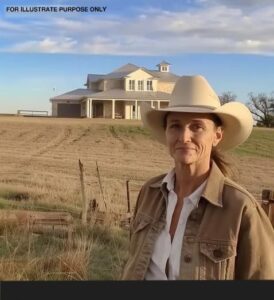The Stranger in My Father’s House Revealed a Truth That Shattered Everything

When my father passed away, I thought I knew the full scope of his life. He was my rock for so long, until debt and hardship wore him down in the last years. When his will revealed he had left me a house I had never heard of, I assumed it was some kind of clerical mistake—or maybe one last burden.
Rain pounded against the rooftops as I made my way to the notary’s office, my coat pulled tight around me.
“What else could possibly be left?” I muttered to myself as I stepped inside.
The notary shuffled through his papers before looking up. “Your father left you… another house.”
My head snapped up. “A house? Not the one I grew up in?”
He slid the documents across the desk. The address was unfamiliar. My hands trembled as I held the papers. My father had never spoken of this place. Why would he keep something like this from me?
There was only one way to find out. I had to see it.
The next morning, I followed a winding road lined with trees painted gold by autumn. When I reached the house, I was startled—it wasn’t abandoned. The porch was freshly painted, and sunlight streamed through its wide windows.
But the key I had been given wouldn’t fit. Someone had changed the locks. Before I could process it, the front door flew open.
“Can I help you?” a stern voice demanded.
A woman in her fifties stood before me, her face tired but defiant.
I stammered, holding out the key. “This house… it was left to me by my father. It’s mine.”
Her eyes flashed. “Your house? I’ve lived here for twenty years. I’ve paid the bills, fixed the leaks, patched the roof. This place is mine.”
I tried to steady my voice. “But the will—”
She cut me off. “Paperwork means nothing. I’ve poured my life into these walls. Do you think a piece of paper can erase that?”
The tension between us crackled like a storm ready to break. Against my lawyer’s advice to “let the courts handle it,” I stayed. She reluctantly allowed me inside, introducing herself with a cold finality: Deborah.
Living with her was a war of nerves. She banged pots at midnight, turned off the water while I brushed my teeth, and hid my belongings in bizarre places. And yet, beneath my anger, I saw her loneliness. This house wasn’t just shelter—it was her last anchor.
But the battle escalated. On the morning of a crucial meeting, I found my freshly laundered clothes tossed into the mud. Furious, I confronted her.
“You treat me like an intruder when I’ve done nothing wrong!” I shouted.
Her teacup rattled against the saucer as she slammed it down. Her eyes burned. “You were never meant to have this house. It was mine—long before you.”
My breath caught. “What are you saying?”
Her voice broke as she stood, trembling. “Because I’m your mother.”
The world tilted beneath me.
She pulled a small bracelet from her pocket, my name and birthdate etched into the metal. My hands shook as I held it.
“He told you I was dead,” she whispered. “But I left. I made a mistake. When I tried to come back, your father refused. The courts gave him everything. He raised you, but he couldn’t bring himself to let me back into your life. This house… it was the only piece of me he couldn’t erase.”
I couldn’t speak. The woman I had resented for days—the intruder I had sworn to fight—was my mother.
The court later ruled in Deborah’s favor. Years of living there, maintaining it, paying its bills—it was legally hers. I left the courtroom feeling hollow. My father’s gift had slipped away before it was ever truly mine.
At the house, I gathered my things, ready to leave for good. But then Deborah stopped me.
“Wait,” she said softly. “I can’t let you walk away again. I’ve hated myself for so long, and I took it out on you. But Emily—you’re my daughter. I don’t want to lose you a second time.”
Her voice cracked, raw with regret. I froze, tears stinging my eyes. Then, without thinking, I stepped forward and embraced her.
“I’m sorry too, Mom.”
The weeks that followed were filled with tentative steps toward healing. We sorted through old boxes, cleaned rooms, and unearthed memories long buried. Slowly, the house transformed—from a battlefield into a home where forgiveness began to bloom.
I learned then that family isn’t about walls or paperwork. It’s about the fragile, painful, beautiful choice to forgive—and to start again.